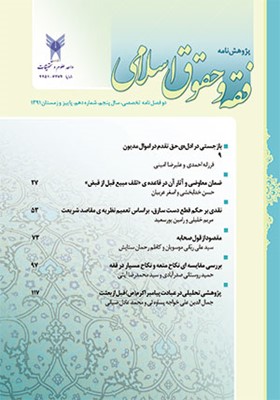به رسمیت شناختن حکومت غیر منصوب
محورهای موضوعی : جامع الفقهیه
1 - ندارد
کلید واژه: حکومت, مشروعیت, رسمیت, مقبولیت, ولایت, وکالت, بیعت, شورا, دموکراسی, فقه سیاسی,
چکیده مقاله :
از ابتدای دوره فقهی، سؤالی که فقهای شیعه درباره حکومت با آن روبهرو بودند، محدود بود به اینکه آیا عملکرد عادلانه برای مشروعیت یک حکومت کافی است یا ضرورتاً نصب یا اذن امام معصوملازم است؟ با آغاز اصلاحات دینی و پیدایش انقلاب صنعتی در اروپا و به دنبال آن تحولات سیاسی واجتماعی و پیدایش مفاهیم و ملاک های جدید برای مشروعیت حکومت ها مانند اگزیستانسیالیسم ودموکراسی، دینداران مسلمان با چالشی سخت روبهرو شدند. موضع دین نسبت به این تحولاتچیست؟ در گفتمان دینی عده ای این مفاهیم جدید را معارض با نظریه ولایت و نصب از طرف شارعیافتند و حکم به عدم مشروعیت آن ها داده و در نتیجه به نظام های برآمده بر اساس این مبانیهمچنان نام حکومت جور نهادند. در طرف مقابل برخی فقها با برداشت های متفاوت از دین سعیکردند تعارض بین این مفاهیم و آموزه های دینی را برطرف کرده و حداقل آن ها را به رسمیتبشناسند. بالاتر آن که گروهی مدعی استنباط همین مبانی از منابع دینی شده و حکم به مشروعیتبا وکالت زمامداران از طرف شهروندان ، آن ها دادند. اما نظریه آیت الله مهدی حائری یزدیاستدلالی که هم از منبع نقل استفاده می کند و هم قواعد عقلی را به کار می گیرد با تبیین محدوده -دخالت وحی در این باب از ابتدا راه ایجاد تعارض بین علم و دین را می بندد. علامه طباطبایی نیز با -استناد به محکمات قرآنی مانند فطرت، تسلط هر فرد دیگری بر سرنوشت انسان ها را نفی می کند.
At the beginning of the juridical duration, the question which the Shia jurisprudents had been dealt with it, was limited to “whether a righteous treatment is sufficient for legitimation of a government, or the Immaculate Leader assignment or permission is strictly necessary for it.With the beginning of the religiousness reformation and incoming of the Industrial Revolution in Europe, and following it, political and social evolution and incoming new concepts and criteria for legitimation of the governments, such as existentialism and democracy, Moslems religious were encountered with a hard challenge:“What is the religion attitude with respect to these reformations?”In the religiousness colloquies, some deduced these concepts as opposite to the “Vellayet theory” and Law Giver assignment and sentenced them to be illegitimate and hence, labeled the systems based on these bases as injustice governments.On the other hand, some jurisprudents tried to remove the oppositeness between these concepts and religiousness learning by getting different deductions of the religion, and at least, to recognize them.More of this, some claimed to deduction of just these bases from religiousness literature, and sentenced them to be legal.But the theory of Ayato-Allah Mahdy Haery, “the proxy of governors from the people”, closes the way of existence of oppositeness between knowledge and religion at first, by declaration of a reasoning which uses both citation sources and intellectual rules, (by illumination of the limit of the inspiration influence in this domain).Also Allame Tabatabai denies the dominance of everybody on the people fate, using the Koran Mohkamat reasoning such as nature.


